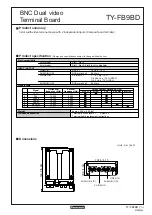
3
Mounting the Reflector:
Installation and Adjustment:
Sample Fixed
Mounting:
Samples For Horizontally Adjusting Mounting:
Samples For Vertically Adjusting Mounting:
Yellow LED
Sensitivity
Adjuster
Red LED
LED Functions:
• Red LED -- When ON, it indicates the sensor is triggered.
• Yellow LED -- When ON, it indicates that the sensor is
properly aligned with the reflector, and the sensor is not
triggered.
Sensitivity Adjustment Functions:
• Min. Setting -- The infrared signal emitted by the sensor is
at its minimum or weakest. This means the sensor can be
easily triggered by small obstructing objects.
• Max. Setting -- The infrared signal emitted by the sensor is
at its maximum or strongest. This means the sensor cannot
be easily triggered by small obstructing objects.
Installation:
1. Mount the reflector and the sensor so they face each other.
2. Connect power to the sensor. Typically the red LED will turn
ON indicating that the sensor and reflector are not yet
properly aligned. If the yellow LED is ON (red LED OFF), it
indicates that the sensor and reflector are aligned (although
it still may be necessary to slightly adjust the alignment).
3. Turn the sensitivity knob to Max.
4. To find the correct alignment, slowly adjust the angles of the
sensor (and/or reflector) up and down and right and left.
NOTE 1: Correct alignment is reached when the red LED
turns OFF and the yellow LED turns ON.
NOTE 2: If both LEDs are OFF, the sensor is at the edge of
sensing the signal, and may not work properly.
Adjusting Sensitivity:
After the sensor and the reflector have been properly installed,
the next step is to adjust the sensor sensitivity.
1. Turn the sensitivity knob counterclockwise to “Min.”
2. Slowly turn the sensitivity knob clockwise until the yellow
LED turns ON. Mark this position “A”.
NOTE: If the yellow LED is ON when the sensitivity knob has
been adjusted to “Min.”, then position “A” will be at “Min.”
3. Put the object to be detected between the sensor and
reflector (in about the place where the object would
normally be detected by the sensor). The yellow LED
should turn OFF (red LED is ON)
4. Slowly turn the sensitivity knob to clockwise until the
yellow LED turns ON. Mark this position “B”.
NOTE: If the yellow LED does not turn ON even when the
sensitivity knob has been adjusted to “Max.” then position
“B” will be at “Max.”.
5. Turn the sensitivity knob counterclockwise until it is set at
the center (midpoint) between points “A” and “B”. This will
be the suggested sensitivity setting.
Testing:
1. Power up the sensor. The yellow LED should be ON; the red
LED should be OFF.
2. Pass the object to be detected between the sensor and
reflector. The red LED should turn ON and the yellow LED
should turn OFF. This indicates that the object has been
detected.
NOTE: If a shiny object, such as a chrome-plated or
stainless-steel item, or something with reflective tape, will
be passing between the sensor and reflector, the sensor
may not be able to detect it. In this case, it may be
necessary to turn the sensitivity knob counterclockwise
until the desired sensitivity setting is obtained.
E-931ACC-BLR1Q
Reflector Bracket
E-931ACC-R1Q
Square Reflector
E-931ACC-BLS7Q
Wall bracket
E-931ACC-BLS8Q
Door Frame Bracket
E-931ACC-BLS6Q
Single-gang Bracket
2
Wiring:
Optional Accessories:
E-931ACC-RC1Q
Round Reflector
E-931ACC-HR1Q
Reflector Hood for
Round/Square Reflector
Mounting the Sensor:
Sample Installations:
Store front door
Black (N.O.)
Gray (N.C.)
White (COM)
RelayOutput
Multi-voltage
circuit
Brown
Blue
]
24-240VAC or
12-240VDC, polarity
not important
Connection (5 wires)
Note:
1. Can be connected to AC or DC voltage.
2. Maximum cable extension length is 325 feet (100m).
Factory assembly line
E-931ACC-BLS1Q
Sensor Bracket
¤¤¤¤¤
¤¤
¤ ¤¤¤¤¤
¤¤¤
W
e
m
e
c
l
o
¤ ¤¤¤¤¤ ¤ ¤ ¤ ¤ ¤ ¤¤¤¤¤¤
¤¤¤¤¤
¤¤
¤¤
¤¤
¤¤
¤¤
¤¤
Garage door
¤¤¤¤¤¤¤¤¤¤¤¤¤¤¤¤¤¤¤¤
Gate
Gate
Gate
Gate
¤ ¤ ¤ ¤ ¤ ¤ ¤ ¤ ¤ ¤ ¤
¤¤
¤¤
¤¤
¤¤
¤¤
¤
Gate
¤¤
¤¤
¤ ¤ ¤ ¤¤¤
Main
entrance
doo
r
Vehicle detection
¤¤¤¤¤
¤¤
¤¤¤¤¤¤¤
¤¤




















